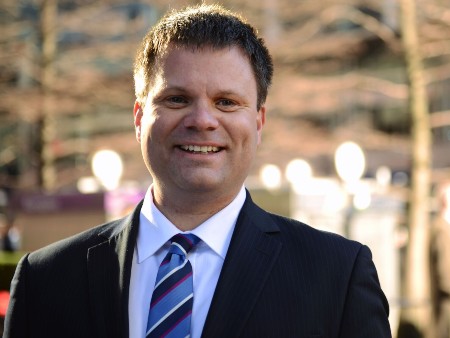Standardising artificial intelligence (AI) across the world is a priority and we must act now, according to a leading risk expert advising the United Nations.
University of Stirling Honorary Professor Markus Krebsz, an expert in risk management and AI, neurotechnology and robotics (‘AiNR-Tech’) and policy researcher at Stirling Management School, is drafting a UN recommendation and is currently developing guidance for governments on the regulation of AI and other digital technologies embedded in products worldwide.
When adopted, they will impact 193 member states and up to 8 billion people worldwide.
Markus shared his thoughts and findings on the controversial topic and provided a development update at a gathering of international trade experts in market surveillance and risk management at the United Nations Economic Commission for Europe (UNECE) in Geneva earlier today.
As the application of AI develops rapidly in commerce and learning, and with AI chatbots and Generative AI dominating headlines, questions are being raised about standardisation, regulatory cooperation and compliance of AI embedded within products. These affect everything from consumer safety, a growing global digital divide, to gender non-bias.
Mr Krebsz, a Founding Director of the Human-AI Institute, has been leading the international expert team’s efforts for the UNECE to produce guidance for member countries.
#He said: “It goes without saying that AI is one of the most dynamic and fast-moving areas in technology and business today. And while products with embedded AI bring many positives to our daily life and to world trade, it’s also fraught with questions, causing substantial regulatory challenges. It is clear that a level playing field would benefit everyone, from consumers to businesses. Developing a globally aligned recommendation and guidance on regulation, standardisation and compliance around AI has to be a priority, and it is crucial we act now.”
Mr Krebsz added of his own research: “Initiated in mid-2020, this ongoing domain has been rapidly evolving. Once adopted by the UN, it will set out good regulatory practices for its 193 governments and member states, with a conceivably wide-ranging impact for 8 billion people globally.”
The draft recommendation from UNECE’s working party is expected to have a period of public consultation before formal adoption at the end of 2023.

Honorary Professor, Stirling Management School
AI is one of the most dynamic and fast-moving areas in technology and business today. And while products with embedded AI bring many positives to our daily life and to world trade, it’s also fraught with questions, causing substantial regulatory challenges. It is clear that a level playing field would benefit everyone, from consumers to businesses.

